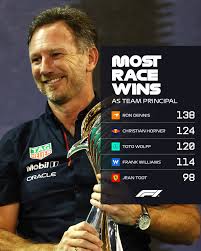The Impact of Christian Horner on Formula 1 Racing

Introduction
Christian Horner, team principal of Red Bull Racing, has played a pivotal role in shaping the landscape of Formula 1 since his appointment in 2005. As the sport becomes increasingly competitive, the strategic decisions made by team leaders like Horner are crucial for the success of their respective teams. The recent 2023 season exemplifies his leadership, with Red Bull Racing dominating the Championship, underlining Horner’s relevance in the world of motorsport.
The Rise of Christian Horner
Born on November 16, 1973, in Leamington Spa, England, Horner initially pursued a career in racing, competing in various categories before transitioning to team management. His breakthrough came when he was appointed to lead Red Bull Racing, a relatively new team at the time. Under his guidance, the team quickly rose to prominence, winning four consecutive Constructors’ Championships from 2010 to 2013. Horner’s vision, combined with technical expertise and market insight, has established Red Bull Racing as a powerhouse in Formula 1.
2023 Season Achievements
The 2023 Formula 1 season has been historic for Red Bull Racing, with Horner at the helm. The team’s driver, Max Verstappen, has been remarkable, and his performances have significantly contributed to Red Bull’s dominant position in the constructors’ standings. By August 2023, Red Bull Racing had secured numerous race victories, showcasing a combination of exceptional engineering and strategic race management led by Horner. This season has further solidified Horner’s reputation as one of the most effective leaders in the sport.
Impact and Future Prospects
Christian Horner’s influence extends beyond race victories. He is known for his ability to navigate complex relationships with key stakeholders, including drivers, sponsors, and Formula 1 executives. His approach has fostered a team culture that values innovation and competitiveness. Looking ahead, as the sport evolves with a focus on sustainability and new technologies, Horner’s strategic foresight will be essential for maintaining Red Bull Racing’s competitive edge. The team’s investment in cutting-edge technologies and commitment to performance will play a critical role in the upcoming seasons, and Horner’s leadership will be integral to those efforts.
Conclusion
Christian Horner stands out as a key figure in Formula 1, not only for his track record of success but also for his ability to adapt to the ever-changing dynamics of the sport. As Red Bull Racing continues to thrive, the significance of Horner’s leadership cannot be understated. Fans and stakeholders alike will be closely watching how his strategies unfold in the years to come, as the next chapter in Formula 1 is sure to be exciting and transformative.




